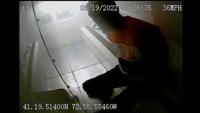A Hazel Green man is now behind bars after the Madison County Sheriff's Office arrested him for murder.Â
Twenty-year-old Gavin Victor Boesch was taken into custody and is now being held in the Madison County Detention Center without bail.Â

The Madison County Sheriff's Office arrested 20-year-old Gavin Victor Boesch Friday night on a charge of murder within the 1000 block of Sublimity Drive in Hazel Green.
Don Webster with Huntsville Emergency Medical Services Inc. said a 56-year-old man was pronounced dead in the 100 block of Sublimity Court.Â
The judge's decision to deny bond was based on Aniah's Law, which Alabama voters approved into law in November 2022.Â
The law is named in honor of 19-year-old Aniah Blanchard, who was killed by a man in 2019 who was out on bond while facing kidnapping, robbery and attempted murder charges in another case.Â
Huntsville attorney Michael Timberlake with the law firm of Timberlake & League P.C. said the new law changed prior norms in the legal system.Â
"Traditionally, you're entitled to a bond in Alabama," said Timberlake. "Capital offenses are an exception in Alabama."
The new law gives judges more freedom in revoking bond, allowing judges to revoke bond in cases of murder, kidnapping, rape and first-degree robbery, among other crimes.Â
"I think the Legislature and the people that were supporting this proposition were trying to prevent further violent crimes," said Timberlake.Â
Timberlake believes the new law could cause some issues within the court system.Â
"If they are denying bail for this variety of offenses, it's going to be subjected to a lot of constitutional skepticism," said Timberlake. "I expect there to be cases to come out of that."
An argument has been made the law violates people's Eighth Amendment rights, which does not allow a person to face an excessive bail.Â
Timberlake said a defendant would typically have a bond hearing before a judge, so their attorney could fight for their right for a bond.Â
"That is all designed to set it up so that they can try and make a case so that it's constitutional," said Timberlake. "In this case, it doesn't seem like that happened."
As part of Aniah's Law, Timberlake said the judge is required to write down their written findings on why they made their decision, but Timberlake said the judge did not do this.Â












